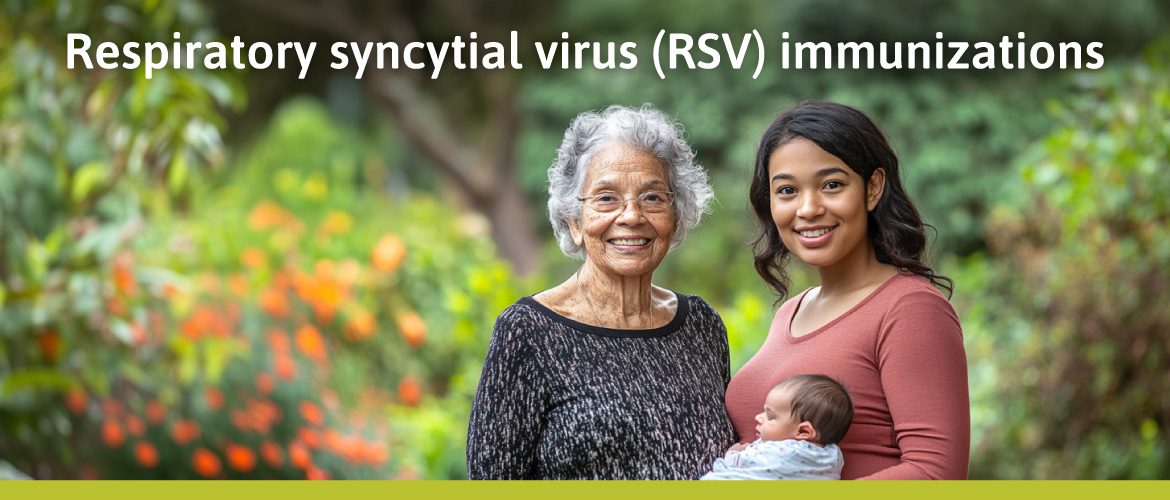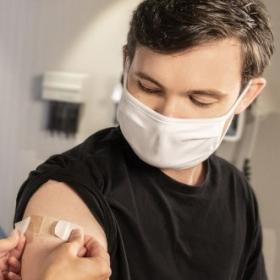On March 31, the ImmunizeBC website will move over to HealthLinkBC.ca After this date, you will be automatically redirected to HealthLink BC’s Immunization landing page. HealthLink BC provides trusted health information online and over the phone 24 hours a day, seven days a week by calling 8-1-1.
Date last reviewed:
Monday, Dec 09, 2024

Disease it protects against
RSV immunization protects against:
- Respiratory syncytial virus
Respiratory syncytial (RSV) is a common virus that often causes mild cold-like symptoms. However, in some cases, it can lead to more serious infections, such as bronchiolitis (inflammation of the small airways in the lungs) or pneumonia (lung infection). Certain groups, including infants and older adults, are at higher risk of developing severe RSV and may require hospitalization. Learn more about the respiratory syncytial virus.
Vaccines for older adults
Health Canada has approved 2 new vaccines to protect older adults from RSV:
-
RSVPreF3 (AREXVY™)
-
RSVpreF (ABRYSVO™)
Both are approved for adults 60 years of age and older.
Canada’s National Advisory Committee on Immunization recommends the RSV vaccine for:
-
Adults 75 and older, especially those who are at increased risk of severe RSV disease.
-
Adults 60 years and older who are residents of nursing homes and other chronic care facilities.
Adults 60 to 74 years of age who would like the vaccine should talk to their health care provider about whether getting the vaccine is right for them.
The vaccine works best when given just before or during the RSV season. In BC, RSV infections often occur in the late fall to early spring. The vaccine is given as 1 dose.
Protecting infants & young children from RSV
Currently, there is no RSV vaccine approved for infants and young children. However, there are two types of products that can help protect them from RSV infection:
- Monoclonal antibody medications (palivizumab and nirsevimab).
- RSV vaccine for pregnant people (called ABRYSVO™).
Both provide protection through passive immunity.
Fact
What is passive immunity?
Passive immunity happens when a person receives antibodies (proteins that fight off germs) from another source instead of producing them on their own through infection or vaccination. This provides immediate protection against infections, but it’s temporary because the body isn’t producing its own antibodies.
Monoclonal antibody medications
Monoclonal antibody medications (palivizumab and nirsevimab) can be given to infants and young children to help prevent severe illness from RSV. Unlike vaccines, which help the body make its own antibodies, monoclonal antibodies provide protection by directly transferring antibodies to the baby through an injection.
How it works: These antibodies specifically target RSV to help prevent severe infection.
Protection: These medications provide immediate but temporary protection. Nirsevimab can protect infants for up to 5 months after it is provided.
Availability in BC: Monoclonal antibodies will not be available for most infants in BC during the 2024-2025 RSV season. Currently, these medications are available only to certain infants and young children through the BC Infant Respiratory Syncytial Virus (RSV) Immunoprophylaxis Program, who meet specific criteria, such as:
- Young, premature babies with chronic medical conditions.
- Infants and young children with major heart or lung conditions.
- Infants living in some remote communities where healthcare access is more limited.
Cost: These medications are free for children who are eligible through the BC RSV Immunoprophylaxis Program. They are not available for private purchase.
RSV vaccine for pregnant people
Monoclonal antibodies will not be available for most infants during the 2024-2025 RSV season. However, the pregnancy RSV vaccine, ABRYSVO™, remains a good way to protect most healthy infants against RSV infections.
ABRYSVO™ is approved for pregnant people aged 18 and older and is the same vaccine that is approved for adults aged 60 and older. The purpose of the vaccine during pregnancy is to protect the baby after birth. When a pregnant person receives the vaccine, their body produces antibodies that pass through the placenta to the baby, providing passive immunity. This gives the baby early protection against RSV during the first few months of life, when they are most vulnerable.
Timing: The vaccine is given just before or during the RSV season, between weeks 32 and the end of 36 weeks of pregnancy (up until 36 weeks and 6 days). For the best protection, it’s important to get the vaccine at least two weeks before birth so the antibodies have enough time to reach the baby.
Safety: ABRYSVO™ is an inactivated (non-live) vaccine that is safe for pregnant people and their developing babies. It is the only vaccine approved for use in pregnancy that has been intentionally tested in pregnant people during clinical trials. Other RSV vaccines are not approved for use in pregnancy.
Cost: The vaccine is not free (it costs about $300) and can be purchased at select pharmacies.
Talk to your health care provider
Talk to your health care provider to learn more about RSV prevention for your child, and to find out which option is best for you based on availability, eligibility, and other factors.
Where to get the RSV vaccine
Use the Clinic Locator on the BC Pharmacy Association website to find a pharmacy with the RSV vaccine. Please book online or call to make an appointment. The RSV vaccine is not free in BC. Some private health insurance plans may cover the cost of the vaccine, so be sure to check with your insurance provider for details.
RSV quick facts
- What it is
-
Respiratory syncytial virus (RSV) is a common virus that usually causes mild, cold-like symptoms. However, in some cases, it can lead to more severe infections such as bronchiolitis (an inflammation of the small airways in the lungs) and pneumonia (an infection of the lungs).Infants and older adults are more likely to become very sick from RSV and need to be hospitalized.Nearly every child will get RSV by the time they are 2 years old. In infants and young children, the younger the child, the higher the risk of hospitalization.In British Columbia, RSV infections often occur between the late fall and early spring.
- How it spreads
-
RSV is very contagious (spreads easily). It can spread:
-
Through close contact, when someone with RSV coughs or sneezes near you, and respiratory particles enter your body through your eyes, nose, or mouth.
-
By touching something that has the virus on it (like a doorknob), and then touching your face before washing your hands.
-
- Symptoms
-
Symptoms of RSV are usually similar to those of the common cold. Symptoms often begin 2 to 8 days after exposure to RSV and may include:
- Runny nose
- Congestion
- Decreased appetite and energy
- Coughing
- Sneezing
- Fever
- Wheezing
In very young infants with RSV, their only symptoms may be:
- Irritability
- Decreased activity
- Eating or drinking less
- Breathing problems
Seek medical attention right away if you or your child are having difficulty breathing, are dehydrated, or showing any other worrisome signs of symptoms.
- Risks
-
Most of the time RSV causes a mild, cold-like illness, but it can also cause severe illness such as:
- Bronchiolitis (inflammation of the small airways in the lung)
- Pneumonia (infection of the lungs)
Infants and older adults are more likely to become very sick from RSV and need to be hospitalized.


